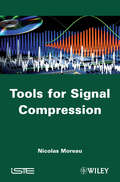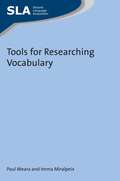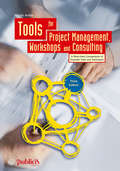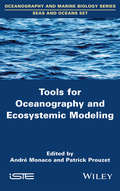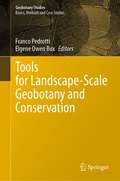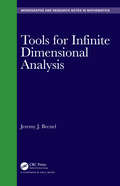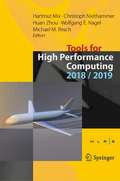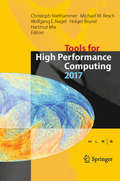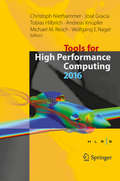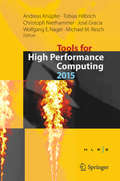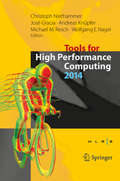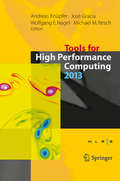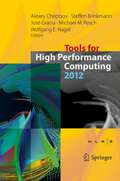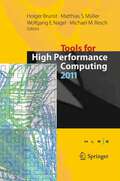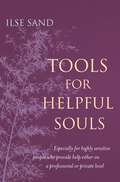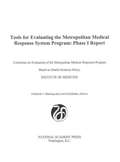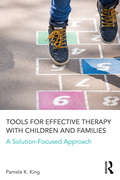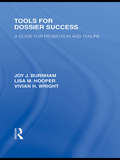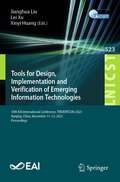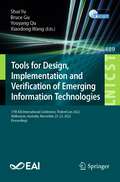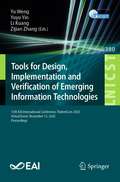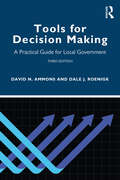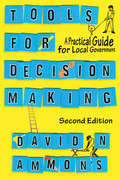- Table View
- List View
Tools for Signal Compression: Applications to Speech and Audio Coding
by Nicolas MoreauThis book presents tools and algorithms required to compress/uncompress signals such as speech and music. These algorithms are largely used in mobile phones, DVD players, HDTV sets, etc. In a first rather theoretical part, this book presents the standard tools used in compression systems: scalar and vector quantization, predictive quantization, transform quantization, entropy coding. In particular we show the consistency between these different tools. The second part explains how these tools are used in the latest speech and audio coders. The third part gives Matlab programs simulating these coders.
Tools for Researching Vocabulary
by Paul Meara Imma MiralpeixThis book introduces an innovative collection of easy-to-use computer programs that have been developed to measure and model vocabulary knowledge. The book aims to help researchers discover new instruments for lexical analysis, and provides a theoretical framework in which studies with such tools could be conducted. Each of the programs comes with a short manual explaining how to use the program, an example of a published paper that uses the program and a set of questions that readers can develop into proper projects. The programs can be used in real research projects and have the potential to break new ground for research in L2 vocabulary acquisition. The book will be of great use to final year undergraduates and masters students in applied linguistics, second language acquisition, psycholinguistics and language testing and to PhD students doing research methods courses.
Tools for Project Management, Workshops and Consulting: A Must-Have Compendium of Essential Tools and Techniques
by Nicolai Andler"This book is of the kind you always wanted but didn't think would or could ever exist: the universal field theory of problem solving." Tom Sommerlatte Typically today's tasks in management and consulting include project management, running workshops and strategic work - all complex activities, which require a multitude of skills and competencies. This standard work, which is also well accepted amongst consultants, gives you a reference or cookbook-style access to the most important tools, including a rating of each tool in terms of applicability, ease of use and effectiveness. In this considerably enlarged third edition, Nicolai Andler presents 152 of such tools, grouped into task-specific categories: Definition of a Situation/Problem - Information Gathering - Creativity - Information Consolidation - Goal Setting - Strategic, Technical and Organisational Analysis - Evaluation and Decision Making - Project Management. Checklists and Application Scenarios further enhance the use of this toolbox. Information provided by this book is: - comprehensive and sufficiently wide in scope, combined with a practical level of detail without being too academic - reliable and proven in numerous real implemented cases - easy to apply due to many different search options, checklists, application scenarios and guiding instructions. Written by a professional consultant, business analyst and business coach, this book is a unique reference work and guide for those wanting to learn about or who are active in the fields of consulting, project management and problem solving in general, both in business and engineering: business coaches and management trainers, workshop moderators, consultants and managers, project managers, lecturers and students.
Tools for Oceanography and Ecosystemic Modeling
by Patrick Prouzet André MonacoStudying the Ocean Planet requires measuring and sampling instruments to feed models that take into account its complexity. This book presents the diversity of observation and monitoring techniques at various scales, but also different kinds of model that take into account some conceptual schemes incorporating various scientific knowledge. Sampling is approached via the efficiency of fishing gears; underwater acoustics is used to detect, count, identify and listen to live and mobile living resources. Bio-logging allows us to rely on the behavior of marine animals to help investigate environments that are difficult to sample by conventional means, while listing the physiological changes they undergo. Modeling is presented not only in a functional framework, but also in an exploratory design incorporating various scenarios for ecosystem changes under the pressure of global change. This ninth volume completes the "Seas and Oceans" Set that adopts a transversal approach leading to the governance and sustainable management of the marine environment.
Tools for Maximizing Your Leadership Potential
by Gareth Jones Rob GoffeeThis chapter asks a series of questions that will help leaders in any context focus on their potential and how it might be developed, and presents an exercise that shows the right combination of skills and authenticity to strive for.
Tools for Landscape-Scale Geobotany and Conservation (Geobotany Studies)
by Elgene Owen Box Franco PedrottiThis book contains the papers presented at the conferences of the International Association Vegetation Science of Pirenopolis (2016) on Applied Mapping for Conservation and Management: from Plant and of Palermo (2017) on Vegetation Patterns in relation to multi-scale levels of ecological complexity: from associations to geoseries. The reports refer to general themes (semiological bases of mapping, dynamic-catenal mapping, nature conservation, plant biodiversity, biogeography, and geosynphytosociology) and their application to vegetation in different parts of the world (Andes of Bolivia, California, Kaga Coast in Japan, Southeastern USA, Morocco, Europe: Carpathians mountains, Swiss Alps, Sicily, Southern Portugal, Spain, and French Atlantic coastal). One of the benefits of the book is that it offers the possibility of comparing the different methodologies used in very different types of vegetation in the world (Boreal, Mediterranean, Tropical, Neotropical, etc.). The book is intended for researchers, Ph.D. students, and university professors.
Tools for Infinite Dimensional Analysis (Chapman & Hall/CRC Monographs and Research Notes in Mathematics)
by Jeremy J. BecnelOver the past six decades, several extremely important fields in mathematics have been developed. Among these are Itô calculus, Gaussian measures on Banach spaces, Malliavan calculus, and white noise distribution theory. These subjects have many applications, ranging from finance and economics to physics and biology. Unfortunately, the background information required to conduct research in these subjects presents a tremendous roadblock. The background material primarily stems from an abstract subject known as infinite dimensional topological vector spaces. While this information forms the backdrop for these subjects, the books and papers written about topological vector spaces were never truly written for researchers studying infinite dimensional analysis. Thus, the literature for topological vector spaces is dense and difficult to digest, much of it being written prior to the 1960s. Tools for Infinite Dimensional Analysis aims to address these problems by providing an introduction to the background material for infinite dimensional analysis that is friendly in style and accessible to graduate students and researchers studying the above-mentioned subjects. It will save current and future researchers countless hours and promote research in these areas by removing an obstacle in the path to beginning study in areas of infinite dimensional analysis. Features Focused approach to the subject matter Suitable for graduate students as well as researchers Detailed proofs of primary results
Tools for High Performance Computing 2018 / 2019: Proceedings of the 12th and of the 13th International Workshop on Parallel Tools for High Performance Computing, Stuttgart, Germany, September 2018, and Dresden, Germany, September 2019
by Christoph Niethammer Wolfgang E. Nagel Michael M. Resch Hartmut Mix Huan ZhouThis book presents the proceedings of the 12th International Parallel Tools Workshop, held in Stuttgart, Germany, during September 17-18, 2018, and of the 13th International Parallel Tools Workshop, held in Dresden, Germany, during September 2-3, 2019. The workshops are a forum to discuss the latest advances in parallel tools for high-performance computing. High-performance computing plays an increasingly important role for numerical simulation and modeling in academic and industrial research. At the same time, using large-scale parallel systems efficiently is becoming more difficult. A number of tools addressing parallel program development and analysis has emerged from the high-performance computing community over the last decade, and what may have started as a collection of a small helper scripts has now matured into production-grade frameworks. Powerful user interfaces and an extensive body of documentation together create a user-friendly environment for parallel tools.
Tools for High Performance Computing 2017: Proceedings of the 11th International Workshop on Parallel Tools for High Performance Computing, September 2017, Dresden, Germany
by Christoph Niethammer Wolfgang E. Nagel Michael M. Resch Holger Brunst Hartmut MixThis book presents the proceedings of the 11th International Parallel Tools Workshop, a forum to discuss the latest advances in parallel tools, held September 11-12, 2017 in Dresden, Germany.High-performance computing plays an increasingly important role for numerical simulation and modeling in academic and industrial research. At the same time, using large-scale parallel systems efficiently is becoming more difficult. A number of tools addressing parallel program development and analysis has emerged from the high-performance computing community over the last decade, and what may have started as a collection of a small helper scripts has now matured into production-grade frameworks. Powerful user interfaces and an extensive body of documentation together create a user-friendly environment for parallel tools.
Tools for High Performance Computing 2016
by Andreas Knüpfer Tobias Hilbrich Christoph Niethammer José Gracia Wolfgang E. Nagel Michael M. ReschThis book presents the proceedings of the 10th International Parallel Tools Workshop, held October 4-5, 2016 in Stuttgart, Germany - a forum to discuss the latest advances in parallel tools. High-performance computing plays an increasingly important role for numerical simulation and modelling in academic and industrial research. At the same time, using large-scale parallel systems efficiently is becoming more difficult. A number of tools addressing parallel program development and analysis have emerged from the high-performance computing community over the last decade, and what may have started as collection of small helper script has now matured to production-grade frameworks. Powerful user interfaces and
Tools for High Performance Computing 2015
by Andreas Knüpfer Tobias Hilbrich Christoph Niethammer José Gracia Wolfgang E. Nagel Michael M. ReschHigh Performance Computing (HPC) remains a driver that offers huge potentials and benefits for science and society. However, a profound understanding of the computational matters and specialized software is needed to arrive at effective and efficient simulations. Dedicated software tools are important parts of the HPC software landscape, and support application developers. Even though a tool is by definition not a part of an application, but rather a supplemental piece of software, it can make a fundamental difference during the development of an application. Such tools aid application developers in the context of debugging, performance analysis, and code optimization, and therefore make a major contribution to the development of robust and efficient parallel software. This book introduces a selection of the tools presented and discussed at the 9th International Parallel Tools Workshop held in Dresden, Germany, September 2-3, 2015, which offered an established forum for discussing the latest advances in parallel tools.
Tools for High Performance Computing 2014
by Andreas Knüpfer Christoph Niethammer José Gracia Wolfgang E. Nagel Michael M. ReschNumerical simulation and modelling using High Performance Computing has evolved into an established technique in academic and industrial research. At the same time, the High Performance Computing infrastructure is becoming ever more complex. For instance, most of the current top systems around the world use thousands of nodes in which classical CPUs are combined with accelerator cards in order to enhance their compute power and energy efficiency. This complexity can only be mastered with adequate development and optimization tools. Key topics addressed by these tools include parallelization on heterogeneous systems, performance optimization for CPUs and accelerators, debugging of increasingly complex scientific applications and optimization of energy usage in the spirit of green IT. This book represents the proceedings of the 8th International Parallel Tools Workshop, held October 1-2, 2014 in Stuttgart, Germany - which is a forum to discuss the latest advancements in the parallel tools.
Tools for High Performance Computing 2013
by Andreas Knüpfer José Gracia Wolfgang E. Nagel Michael M. ReschCurrent advances in High Performance Computing (HPC) increasingly impact efficient software development workflows. Programmers for HPC applications need to consider trends such as increased core counts, multiple levels of parallelism, reduced memory per core, and I/O system challenges in order to derive well performing and highly scalable codes. At the same time, the increasing complexity adds further sources of program defects. While novel programming paradigms and advanced system libraries provide solutions for some of these challenges, appropriate supporting tools are indispensable. Such tools aid application developers in debugging, performance analysis, or code optimization and therefore make a major contribution to the development of robust and efficient parallel software. This book introduces a selection of the tools presented and discussed at the 7th International Parallel Tools Workshop, held in Dresden, Germany, September 3-4, 2013.
Tools for High Performance Computing 2012
by José Gracia Wolfgang E. Nagel Michael M. Resch Alexey Cheptsov Steffen BrinkmannThe latest advances in the High Performance Computing hardware have significantly raised the level of available compute performance. At the same time, the growing hardware capabilities of modern supercomputing architectures have caused an increasing complexity of the parallel application development. Despite numerous efforts to improve and simplify parallel programming, there is still a lot of manual debugging and tuning work required. This process is supported by special software tools, facilitating debugging, performance analysis, and optimization and thus making a major contribution to the development of robust and efficient parallel software. This book introduces a selection of the tools, which were presented and discussed at the 6th International Parallel Tools Workshop, held in Stuttgart, Germany, 25-26 September 2012.
Tools for High Performance Computing 2011
by Wolfgang E. Nagel Michael M. Resch Matthias S. Müller Holger BrunstThe proceedings of the 5th International Workshop on Parallel Tools for High Performance Computing provide an overview on supportive software tools and environments in the fields of System Management, Parallel Debugging and Performance Analysis. In the pursuit to maintain exponential growth for the performance of high performance computers the HPC community is currently targeting Exascale Systems. The initial planning for Exascale already started when the first Petaflop system was delivered. Many challenges need to be addressed to reach the necessary performance. Scalability, energy efficiency and fault-tolerance need to be increased by orders of magnitude. The goal can only be achieved when advanced hardware is combined with a suitable software stack. In fact, the importance of software is rapidly growing. As a result, many international projects focus on the necessary software.
Tools for Helpful Souls: Especially for highly sensitive people who provide help either on a professional or private level
by Ilse SandHighly sensitive people spend a lot of time trying to balance their surroundings, including the emotions and wellbeing of those around them, which lends to a supportive and caring nature. While highly sensitive people are well-suited for the role of 'helper', this practice can be particularly exhausting if not regulated. This book contains a variety of tools geared towards self-development and optimising a helpful and supportive conversation in professional therapeutic settings or personal relationships. This practical guide demonstrates how to use simple psychotherapeutic methods through supportive dialogues, which can be applied by anyone without any formal training. Written in easy language with real-life examples and practical exercises, this will serve as a handbook for highly sensitive people who provide help either on a professional or personal level.
Tools for Foresight: Planning for the Unpredictable Future
by Arie De GeusThough you can't predict the future, this chapter illustrates how future success depends on understanding the multiple ways the future could unfold.
Tools for Evaluating the Metropolitan Medical Response System Program: Phase I Report
by Committee on Evaluation of the Metropolitan Medical Response ProgramInformation on the Tools for Evaluating the Metropolitan Medical Response System Program
Tools for Effective Therapy with Children and Families: A Solution-Focused Approach
by Pamela K. KingTools for Effective Therapy with Children and Families provides mental health professionals with step-by-step tools and strategies for effective therapeutic outcomes with children and their families. An integration of solution-focused brief therapy and play therapy, this groundbreaking book is uniquely suited to clinicians working with school-aged children and their parents. Tools for Effective Therapy with Children and Families uses clearly articulated and creative play activities to elicit conversations about solutions, successes, and collaborative goals with clients. Session transcripts and technique illustrations throughout the chapters allow clinicians to see the solution-focused approach in action.
Tools for Dossier Success: A Guide for Promotion and Tenure
by Lisa M. Hooper Joy J. Burnham Vivian H. WrightTools for Dossier Success demystifies the dossier process from start to finish. Written for faculty members at different points in their academic trajectory, this is a practical, step-by-step guide to planning, creating, and polishing the best possible representation of accumulated evidence and accomplishments in teaching, research, and service. The "how to" information offered here is essential for those seeking tenure or promotion from associate professor to professor, senior faculty serving as mentors, and graduate students planning an entrance into academia. Key features include: Relevant and useful information for faculty in diverse disciplines and settings A comprehensive six-step model to ensure the best representation of one’s work Tips and suggestions to help avoid common pitfalls Best practice examples from successful tenured faculty Steps for seeking out assistance from other faculty, mentors, and peers A balanced review of the "ups and downs" of the tenure process
Tools for Design, Implementation and Verification of Emerging Information Technologies: 18th EAI International Conference, TRIDENTCOM 2023, Nanjing, China, November 11-13, 2023, Proceedings (Lecture Notes of the Institute for Computer Sciences, Social Informatics and Telecommunications Engineering #523)
by Xinyi Huang Lei Xu Jianghua LiuThis book constitutes the refereed post-conference proceedings of the 18th EAI International Conference on Tools for Design, Implementation and Verification of Emerging Information Technologies, TridentCom 2023, which was held in Nanjing, China, during November 11-13, 2023. The 9 full papers were selected from 30 submissions and deal the emerging technologies of big data, cyber-physical systems and computer communications. The papers are grouped in thematical sessions on blockchain and its applications; emerging applications; AI and its security.
Tools for Design, Implementation and Verification of Emerging Information Technologies: 17th EAI International Conference, TridentCom 2022, Melbourne, Australia, November 23-25, 2022, Proceedings (Lecture Notes of the Institute for Computer Sciences, Social Informatics and Telecommunications Engineering #489)
by Xiaodong Wang Shui Yu Bruce Gu Youyang QuThis book constitutes the refereed post-conference proceedings of the 17th EAI International Conference on Tools for Design, Implementation and Verification of Emerging Information Technologies, TridentCom 2022, which was held in Melbourne, Australia, in November 23-25,2022. The 11 full papers were selected from 30 submissions and deal the emerging technologies of big data, cyber-physical systems and computer communications. The papers are grouped in thematical sessions on network security; network communication; network services; mobile and ad hoc networks; blockchain; machine learning.
Tools for Design, Implementation and Verification of Emerging Information Technologies: 15th EAI International Conference, TridentCom 2020, Virtual Event, November 13, 2020, Proceedings (Lecture Notes of the Institute for Computer Sciences, Social Informatics and Telecommunications Engineering #380)
by Zijian Zhang Yuyu Yin Yu Weng Li KuangThis book constitutes the refereed post-conference proceedings of the 15th EAI International Conference on Tools for Design, Implementation and Verification of Emerging Information Technologies, TridentCom 2020. Due to COVID 19 pandemic the conference was held virtually. The 12 full papers were selected from 32 submissions and deal the emerging technologies of big data, cyber-physical systems and computer communications. The papers are grouped in thematical sessions on computer network and testbed application as well as analytics for big data of images and test.
Tools for Decision Making: A Practical Guide for Local Government
by David N. Ammons Dale J. RoenigkThis book guides readers to the mastery of a wide array of practical analytic techniques useful to local governments. Written in an easy-to-read style with an emphasis on providing practical assistance to students, local government practitioners, and others interested in local government performance, this updated third edition features analytic methods selected for their relevance to everyday problems encountered in city and county governments. The authors outline a variety of practical techniques including the simplest that the fields of management, public administration, policy analysis, and industrial engineering have to offer. Each analytic technique is introduced in the context of a fictitious case presented over a few pages at the beginning of that technique’s chapter. Contents include demand analysis, work distribution analysis, process flow-charting, inflation adjustments, annualizing capital costs, staffing analysis, identifying full costs of a program or service, present value analysis, life-cycle costing, lease/buy analysis, cost-effectiveness analysis, benchmarking analysis, and more. This updated third edition features a dramatic expansion of Excel-based applications, plus templates and exercises accompanying many of the chapters and available online. New chapters prepare readers to: • use statistical tests to identify significant differences in performance averages; • construct Pareto charts; • develop cause-and-effect diagrams; • prepare control charts; • detect possible discrimination in hiring and appointment practices; and • present analytic evidence more effectively. This book is an essential resource for students and instructors of public administration courses on analysis, methods, evaluation, productivity improvement, and service delivery. Online resources for this book, including Excel templates, are available at https://toolsfordecisionmaking.sog.unc.edu
Tools for Decision Making: A Practical Guide for Local Government
by David N. AmmonsKnown for encouraging step-by-step problem solving and for connecting techniques to real-world scenarios, David Ammons’ Tools for Decision Making covers a wide range of local government practices—from the foundational to the advanced. Brief and readable, each chapter opens with a problem in a hypothetical city and then introduces a tool to address it. Thoroughly updated with new local government examples, the second edition also incorporates chapters devoted to such additional techniques as sampling analysis, sensitivity analysis, financial condition analysis, and forecasting via trend analysis. Numerous tables, figures, exhibits, equations, and worksheets walk readers through the application of tools, and boxed features throughout each chapter present other uses for techniques, helpful online resources, and common errors. A handy guide for students and an invaluable resource and reference for practitioners.Students can visit college.cqpress.com/TDM for more opportunities to put these tools to use. Instructors can register for access to the solutions.
